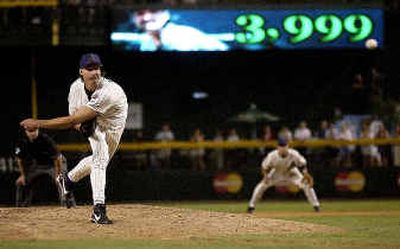Johnson takes K’s in stride

So what’s all the fuss?
For a major league hitter, striking out against Randy Johnson is like marrying Elizabeth Taylor: Sooner or later, it happens to everybody.
“All you have to do is go through the media guide,” said Arizona Diamondbacks left fielder Luis Gonzalez. “There’s about three or four pages of people he’s struck out. And then you start looking at the names: Hall of Famers and All-Stars right on down to rookies.”
San Diego’s Jeff Cirillo is none of those things. But today he stands apart on that long and often distinguished list.
At 8:35 p.m. Tuesday, Cirillo became Johnson’s 4,000th strikeout victim, a string that started on Sept. 15, 1988, when Omar Orestes of the Pirates went down swinging in the second inning against the gangly Expos rookie left-hander.
Johnson struck out Cirillo on a full-count check swing to start a strike-‘em-out, throw-‘em-out double play that ended the eighth inning. He took off his cap and waved to the crowd as he stepped across the third-base line on the way to the dugout, but did not make a curtain call, even as the crowd of 34,633 roared for him. Johnson joined Nolan Ryan, Steve Carlton and Roger Clemens in the exclusive 4K club, but his demeanor did not suggest an epic feat.
Better to leave it to others to put it into context, then.
D-Backs reliever Scott Service, who like Johnson made his big league debut in 1988, offered a pitcher’s perspective on Johnson’s milestone.
“How about this? ” Service said. “Randy’s at 4,000 strikeouts. I got my 400th earlier this year. “
Service shook his head.
“He averages about 10 or 12 strikeouts a game. That means he’s facing the same guys two or three times. Big league hitters make adjustments. But it doesn’t matter. His stuff is just too good.”
Ryan Klesko and Cirillo can attest to that. Both struck out twice Tuesday, as did Brian Sweeney, who really shouldn’t count because he’s a pitcher.
Gonzalez can, though. He faced Johnson only once, in 1988, when Gonzalez was with Detroit and Johnson was pitching for Seattle.
“He got me three times,” Gonzalez said, with a grimace that has lingered six years. “One game. That was enough for me.”
With 10 percent of Johnson’s strikeout total, Service admits getting a strikeout is a pleasure.
“It’s a thrill, sure,” he said. “As a pitcher, what you want is to get the guy out on the first pitch. But if you can’t do that, then you want to strike him out. It’s a good feeling. You don’t have to rely on anybody else. You do it yourself.”
Service isn’t sure that Johnson feels the same thrill. After all, striking people out is a pretty common occurrence for the Big Unit.
“He just goes about his business,” Service said. “You would think somebody with 4,000 strikeouts would be a little cocky about it. He’s not at all. He just goes on to the next guy.”
Johnson’s final two strikeouts seemed almost a tribute to the fire-balling Johnson of the `90s followed by the more versatile Johnson of today.
Strikeout 3,999 was vintage Johnson.
Klesko, who had argued briefly with home plate umpire Tim Welke in the second inning when he took a called third strike — Johnson’s first K of the night — fell behind 0-2 to Johnson with two out in the seventh inning.
Johnson threw the next pitch to the backstop, perhaps sending a message to Klesko. In any event, it harkened back to the wild days of the young Johnson, whose lack of control and 6-foot-10 frame made him a fearful sight on the mound.
On the next pitch, Johnson reached back and cut loose a 97 mph heater. Klesko took a mighty rip… and missed. Strikeout 4,000 illustrated Johnson’s evolution.
At age 40, he relies now as much (if not more) on his slider than his fastball. He is more adept to deceive than dominate.
In that sense, strikeout No. 4,000 — a check swing that indicates the batter was fooled — represents the modern Johnson.
Not that it matters much to hitters. Either way is miserable.
“It stinks,” Gonzalez said.